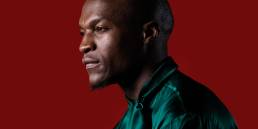Start by doing what’s necessary, then do what’s possible and suddenly you are doing the impossible.
That’s what religious icon St. Francis of Assisi said – a modus operandi that has defined the unlikely success of scriptwriter and actor Chris Q. Radebe.
I call Chris late one evening ahead of the presentation for the creative direction that would be the foundation for his cover-shoot. Having asked only a few questions, he generously lays out his difficult life journey that saw him orphaned by the time he left school and by the time he was 25, the only one of his siblings remaining. With no other option left, Radebe chose to pursue what he had always wanted to do, regardless of the seeming insurmountable odds. Left with no devises but that of his own, Radebe did life the Assisi way by doing what was necessary, which included leaving home straight after Matric, to doing what was possible which included working as a security guard in order to save up money for a writing tool – a computer, to suddenly doing the impossible – which has played out in him going from being a no name in the industry to writing scripts for much-loved shows such as The Queen, The River, The Throne and Rhythm City and becoming the Head Writer for Uzalo – the number one show in the country.
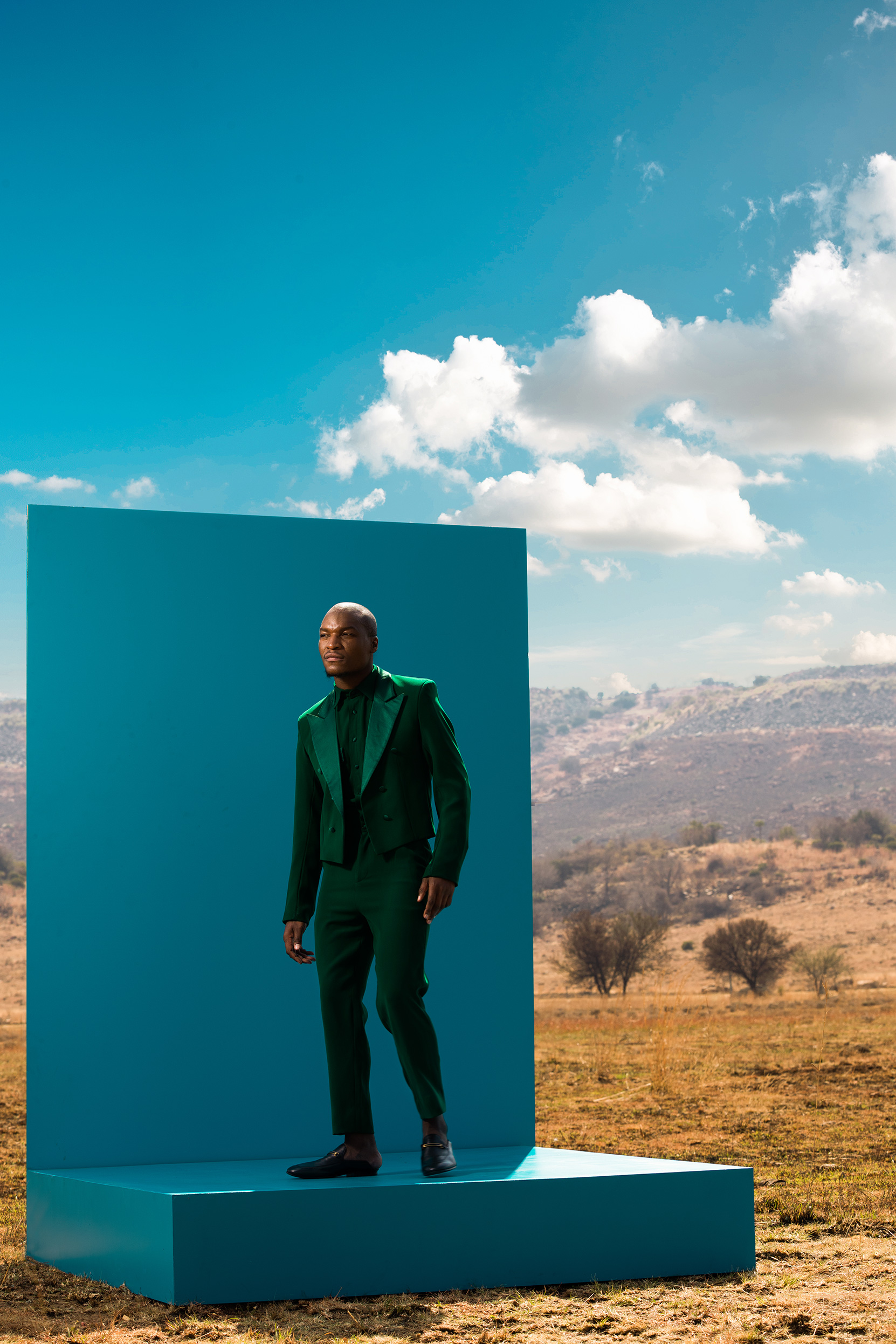
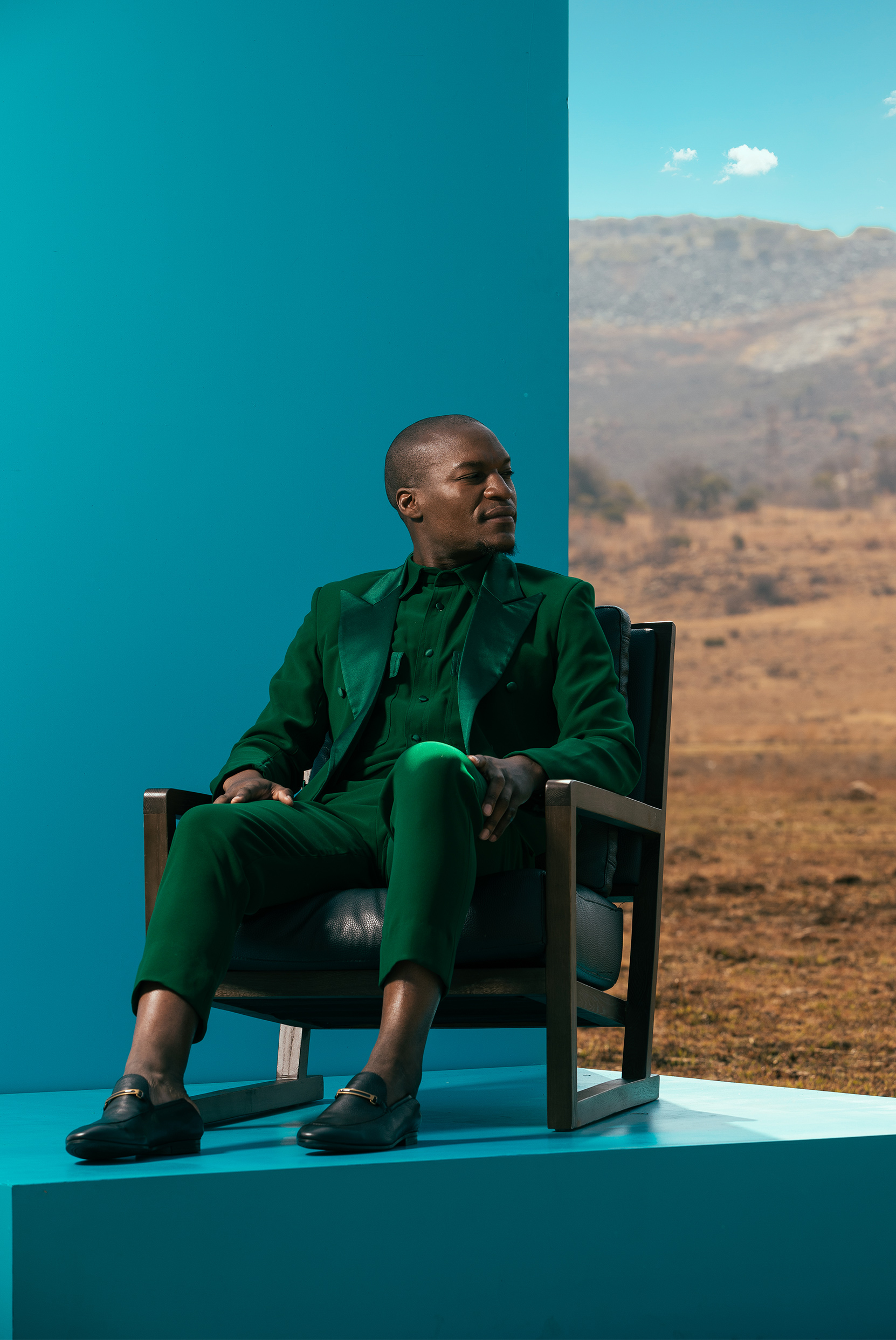
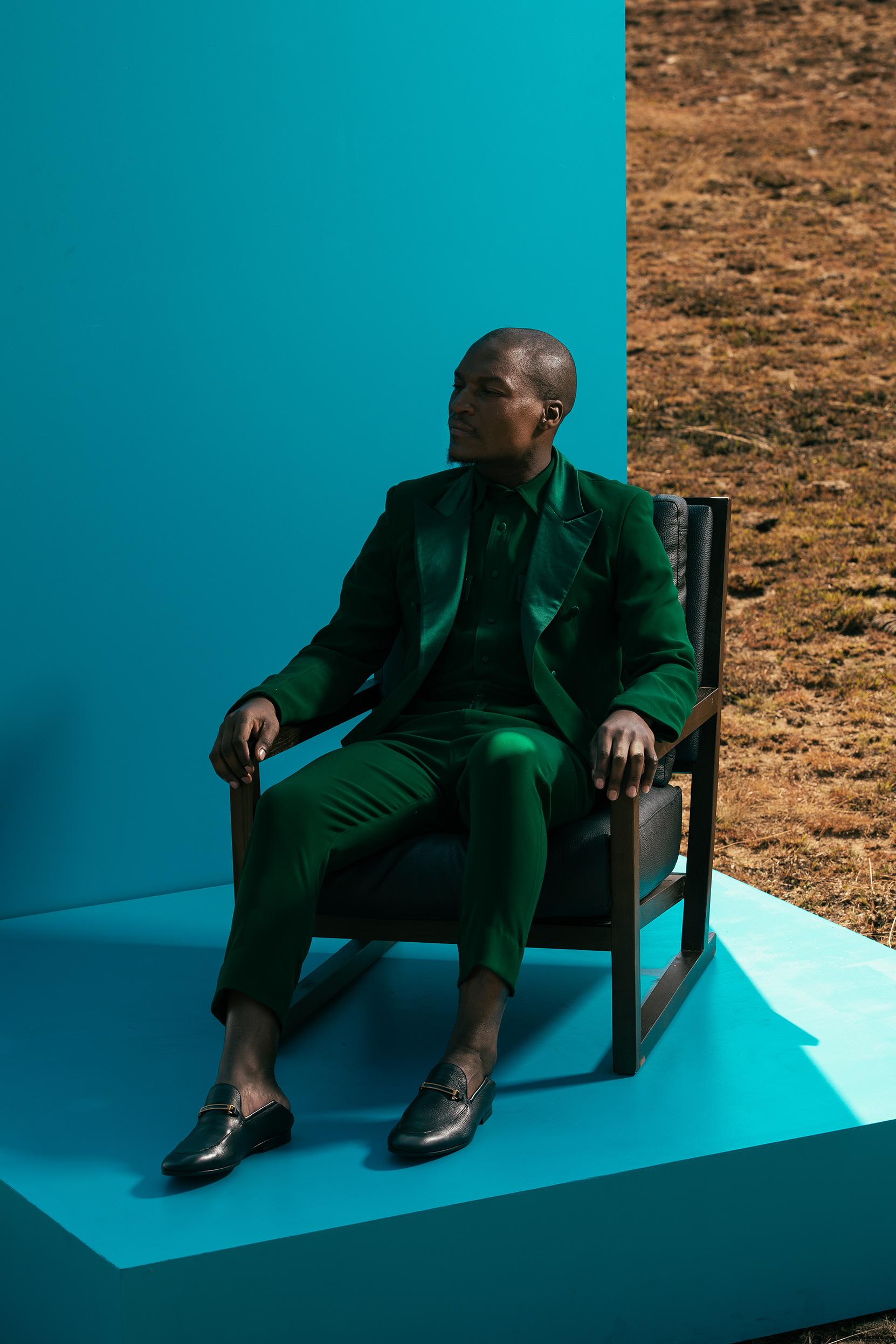
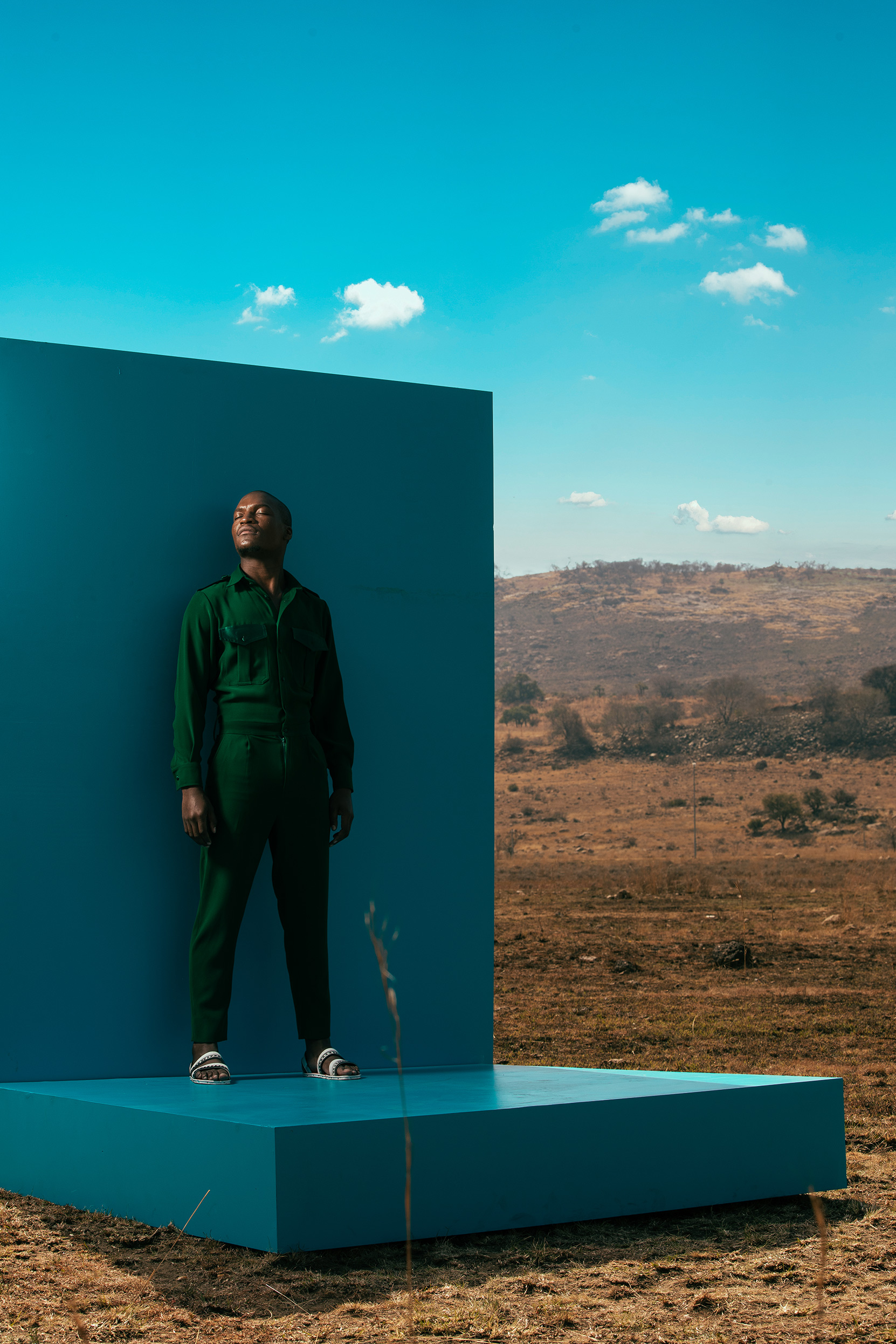


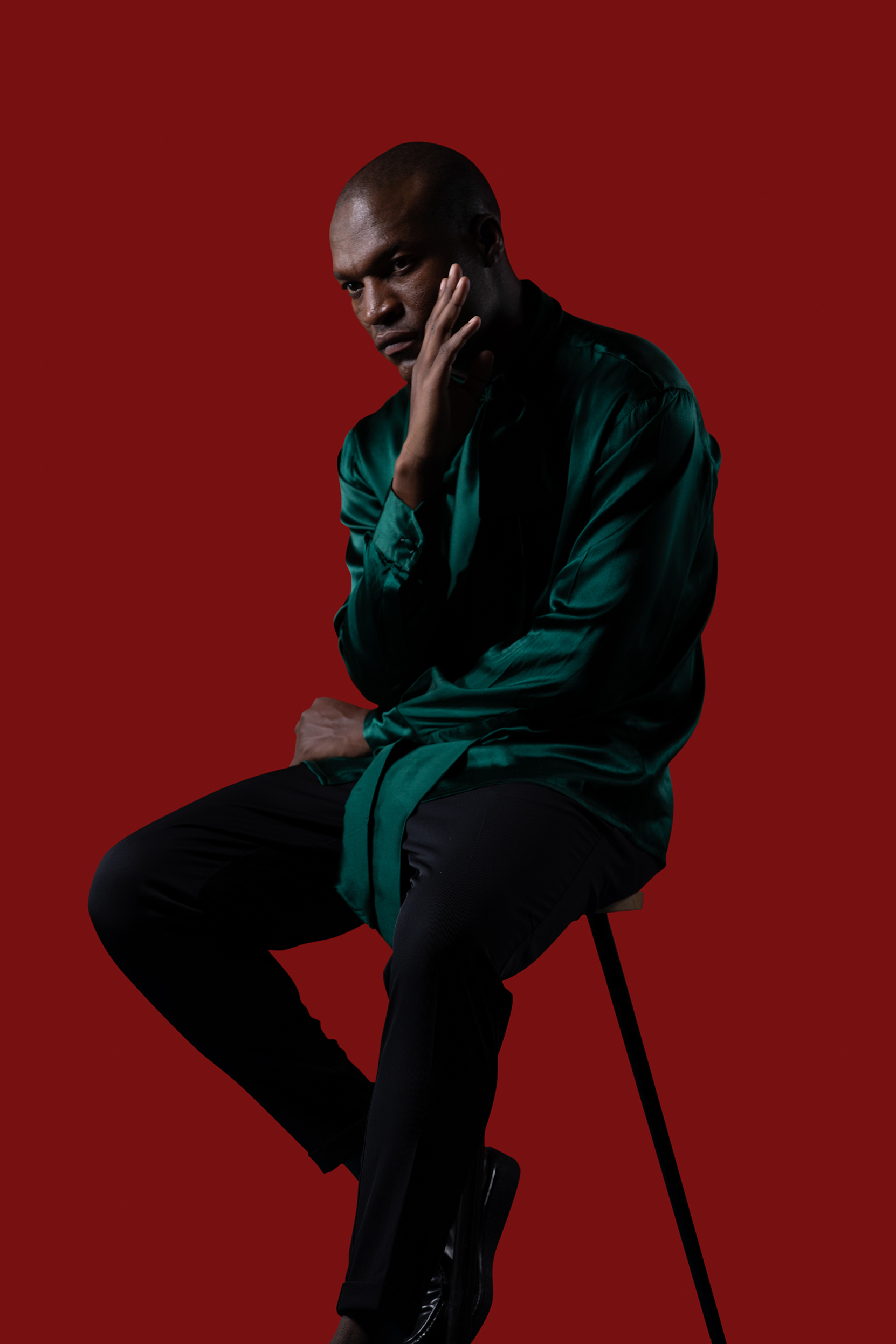
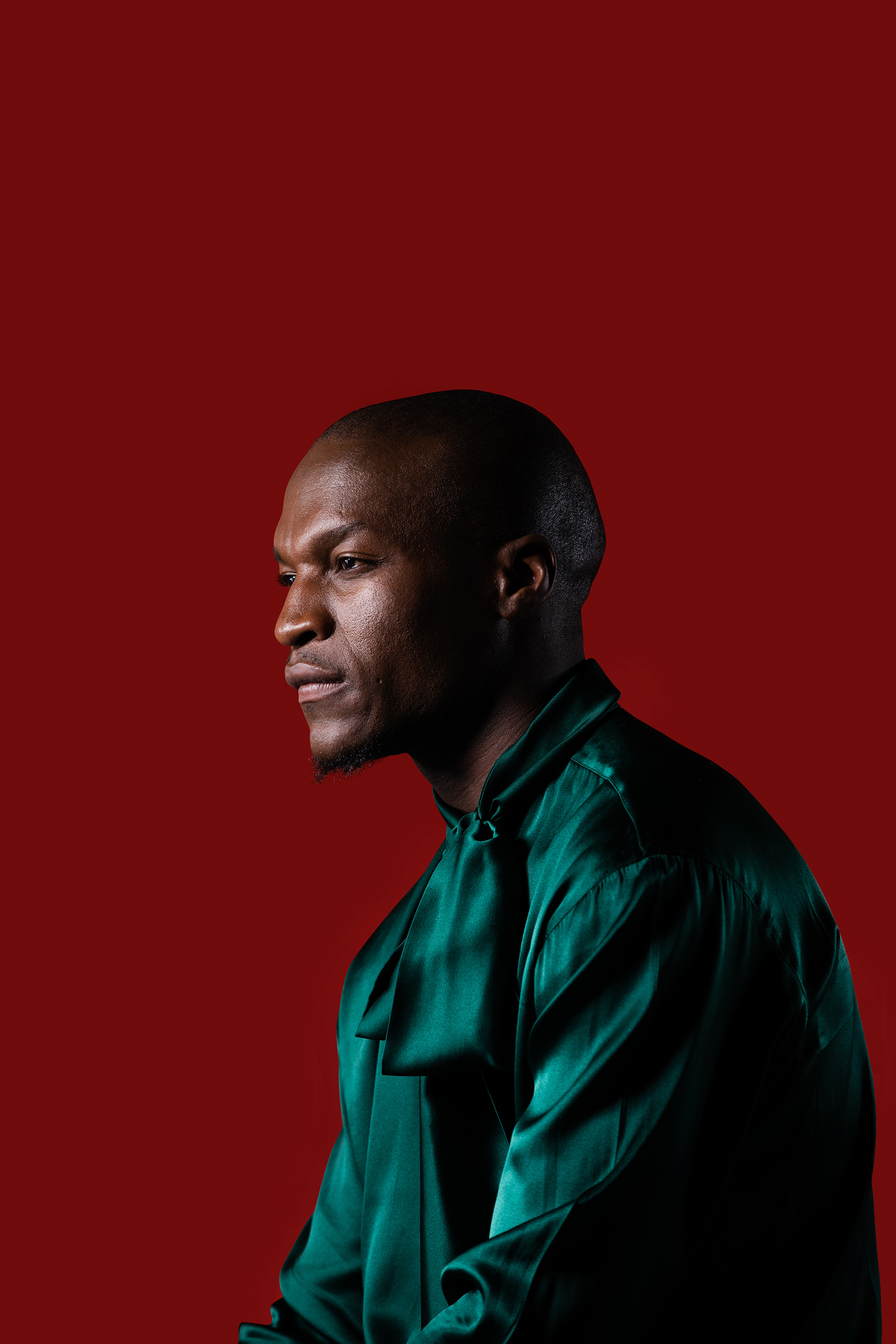
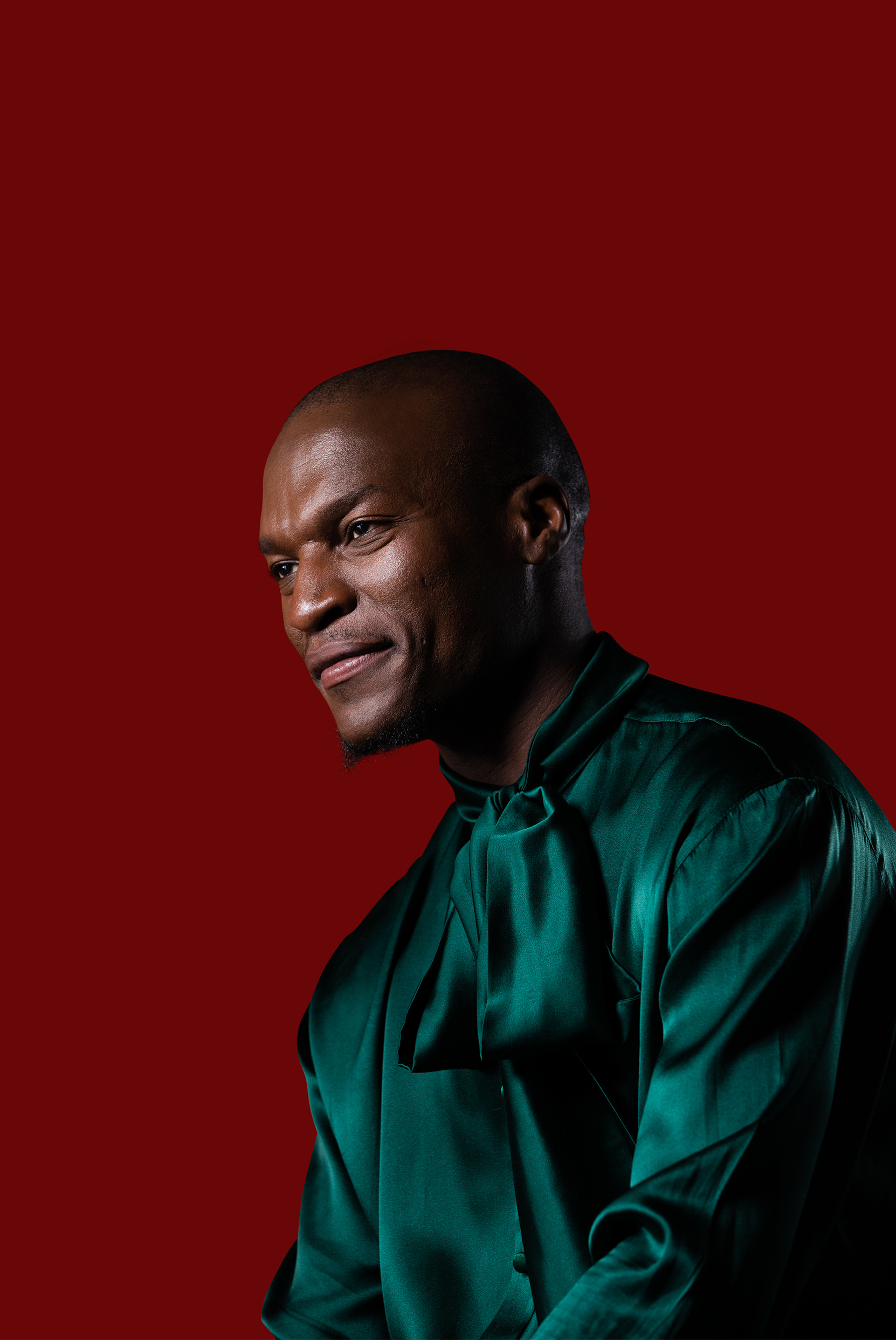
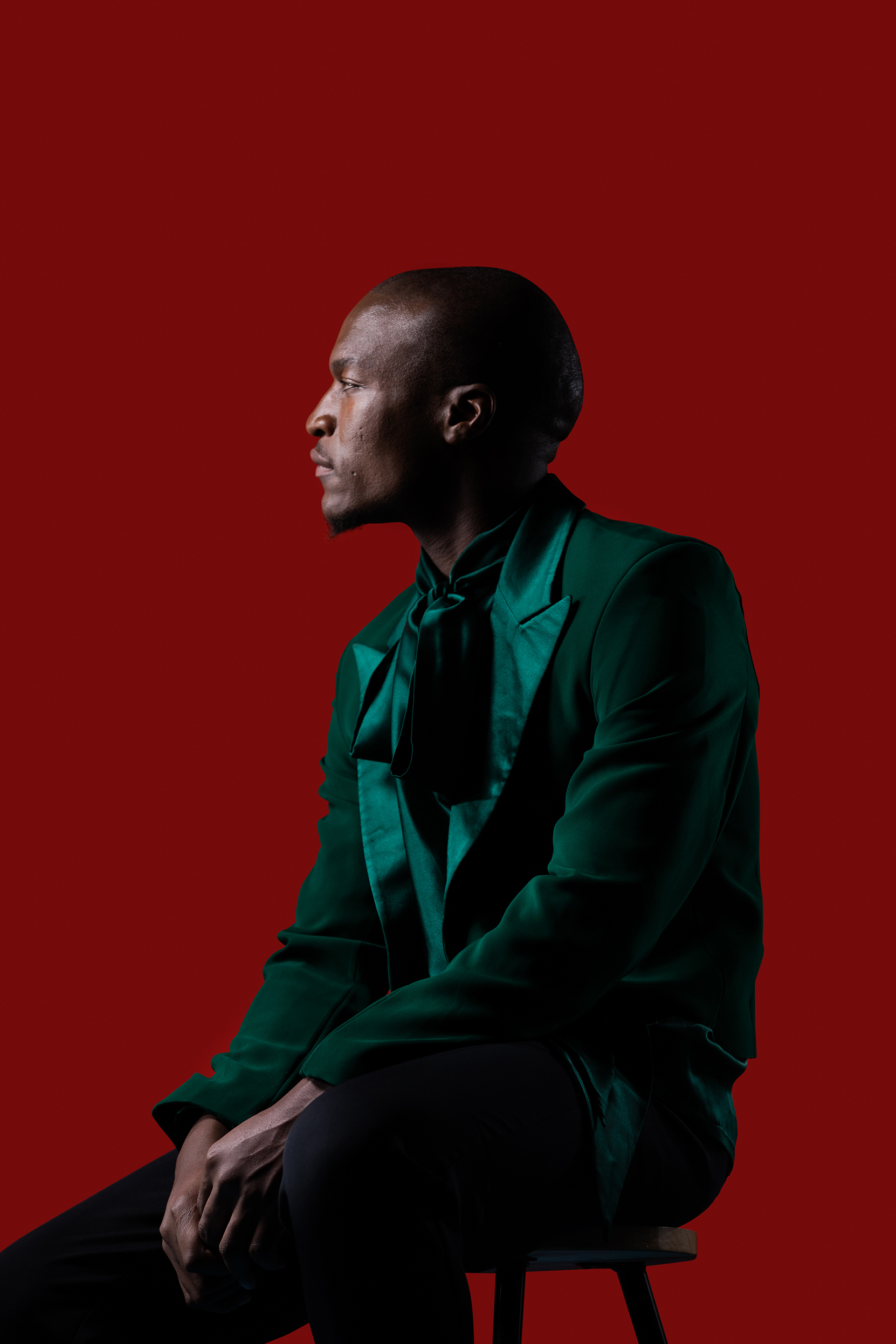
For audiences who are familiar with Radebe’s face, they will have recognized him either from Isithembiso where he played the troublesome character Romeo, or from Isibaya where he played the rightful King who acted in all the wrongful ways, Chief Dabula. Both Isithembiso and Isibaya are products of Bomb Productions. One of the founding leaders, Angus Gibson, saw a side of Radebe that he was yet to see in himself. “The acting thing was a big surprise for me” says Radebe during our sit-down. “Acting was never what I wanted to do. Growing up all I ever wanted to be was a writer but Angus Gibson offered me an opportunity to have a role in front of the camera for a small role on Isithembiso and surprisingly, I was hooked!”
Author of The Secret, Rhonda Byrne writes in the best-selling book that, “Thoughts are magnetic, and thoughts have a frequency. As you think thoughts, they are sent out into the Universe, and they magnetically attract all like things that are on the same frequency. Everything sent out returns to the source – you.” Radebe’s life today depicts the truth of Byrne’s perspective. On the incidence that inspired what has become his career today, Radebe says, “When I was in the 10th Grade, I realized that the soapie I loved, Generations, had a writing team and I thought that I would love to be a part of that.”
Radebe’s thoughts became persistent every time he watched the Morula Pictures classic as his gaze remained fixed on the credits that referred to the writing team. If Byrne were a witness to his journey, she too would observe that the persistent thought he had to become a writer, magnetized sweet-spot moments of confirmation that one day, he too would have the privilege of seeing his name roll up with the credits as part of the writing team, let alone at the helm.
Radebe says, “I finished Matric and I didn’t have the means to further my education. It was a blessing in disguise because even if I did have the means, I would not have known what to study – all I knew is that I wanted to write which directed me somehow. I loitered around for a bit because I didn’t have any kind of support. In late 2003, I was watching Take 5 which actress Kim Engelbrecht hosted. During her interview with Generations Head Writer at the time Christian Blomkamp, she asked him what one needed to study in order to be a writer to which he responded that writing really had very little to do with what one studied and everything to do with calling – you either are a writer or not. He mentioned that he was an accountant before he became a scriptwriter. Having passed the script test for Generations, he never looked back.”
The audacity Blomkamp showed to approach the team behind the leading show at the time, encouraged Radebe to do the same – approach the scriptwriting department of a leading show and request an opportunity to write the test. At the time, Radebe was unemployed and struggling to survive while living in Durban having had left Johannesburg (Joburg) after Matric. “I came back to Johannesburg in search of the script department at the SABC only to find that the scripting team did not sit there. I thought that since I was still in Joburg, Isidingo scriptwriting was worth pursuing. Upon receiving a number to call from the SABC reception, I managed to get in touch with the script coordinator Winnie Serite, now the Executive Producer of Skeem Sam, who advised that I return the following year in order to write the test as the festive season was upon them and getting feedback would be difficult.”
Slightly discouraged with nowhere to wait out the final months of that year, Radebe consoled himself, made a plan and returned to call Serite on the first day of Isidingo’s operations in 2004. Radebe was finally afforded the opportunity to write the test which he did with much difficulty, sourcing ideas from libraries and having to complete it using a computer which he had had no exposure to at the time. Of this critical moment during his journey, Radebe says, “The writing test took forever for me to complete…I would go to the library, pay R2,50 per hour for use of the computer facilities but would still have to wait for someone to sit next to me in order to ask how to use the functions of the computer.”
Radebe eventually completed the test and progressed from battling to save a document in a floppy disk – things millennials will never know – to eventually passing the writing test…. yet having no personal computer to write scripts on. What felt like a victory at face-value when he was told “You’re one of us now” by the writing team 2 months after writing the test, became yet another challenge as now Radebe, at the edge of securing the writing gig that would change his family’s life, let alone his non-existent state of employment, had to find a way to see a computer miraculously manifest as his own.
What today is a luxury for Radebe, as he writes for a production based in Durban from the comfort of his own home, was the worst reality for him at the time. Radebe recalls, “I hardly had a home, let alone a computer. Then I was asked for an e-mail address and had no idea what that was or that it wouldn’t take me out of pocket even further – everything was new.”
“I come from Mohlakeng in Randfontein. When I finally received the job on Isidingo and I asked folk from my community for a computer, nobody believed me because me getting a job on a platform that big was unbelievable to them. What the SABC produced was almost akin to a world that wasn’t real for people like us. Then I decided to do whatever job necessary in order for me to buy it myself.” Radebe says.
Having matriculated well with teachers who said that his future was bright, Radebe knew that the best job he could get at the time would not mirror that “bright future” that he was destined to have. He chose to leave Joburg and head back to Durban where he could work as a security guard and save up for his computer without the potential glare from former teachers or high school classmates. Returning to Joburg with a computer in toe, ready to write, he faced another reality of the industry – being easily forgotten when you’re not perpetually visible. The opportunity to write for characters from Horizon Deep was gone as he had been gone too long having worked hard to fund this computer form a security guard’s salary and coming back in 2008 – 4 years after passing the test.
Radebe painfully recalls this stormy period which emerged with a silver lining when he says, “The team didn’t remember me and the Head Writer who was there during my scriptwriting test days now worked on another production. It was the worst feeling in the world but a blessing in disguise – what was a guy from Mohlakeng going to write for the likes of Barker Haines?!? I was going to get fired.”
Akin to the resistance that desperation usually creates, Radebe stared at the closed window of opportunity that was writing for Isidingo for two years until he made a decision to choose another route to his destiny. Media mogul Oprah Winfery once said, “Understand that the right to choose your own path is a sacred privilege. Use it. Dwell in possibility.” In 2010, Radebe chose the next route of his own path by considering the possibility of writing for etv’s Rhythm City. Radebe wrote the scriptwriting test and got the job. This time Radebe approached the opportunity as a different man with a better understanding of the world who was better positioned and with a confidence that had its foundation on the face that he now understood the industry.
Radebe says “Writing for Rhythm City was a far better beginning for me because the characters were relatable. Isidingo would have been like going to Sandton – an unfamiliar place to me at the time…I was going to fail.” True to what is commonly said that God’s delay is not denial, one could assume that Radebe’s ancestors knew that writing is an art and true to any artist’s work – each stroke of genius is a personal expression of that art. His art needed the right canvas in order to reflect as intended. The Rhythm City opportunity was the end of his struggle and the beginning of what has been a glorious career in the industry to-date. Today, Radebe’s hands have graced the scripts of leading telenovelas and soapies with one of his favorite characters to have written for being that of Thuso “Cobra/Cobrizi” Mokoena, due again, to the character’s relatability. It’s no surprise then that the brilliant execution by Presley Chweneyagae afforded the telenovela the South African Film & Television Awards (SAFTA) 2019 award for Best Actor in a Telenovela.
If there is anything glaringly obvious about Radebe’s social media, it’s his rather fascinating fascination with tennis. Radebe carries a similar narrative to success in his filed as does World No.1 ranked male tennis player, Novak Djokovic who also happens to be Radebe’s personal favorite. In explaining how he attained this position, Djokovic has said, “I’ve always wanted to be one thing since I was 7 years old – No.1. The problems when I was down were caused by myself as I was not decisive enough. I then stopped thinking too much about what could happen, lost my fears and relied on my physical and mental strength to play the right shots at the right time. Ultimately, the winner is the one who believes in victory more…and I make sure that that I’m the better believer.”
Djokovic’s winner’s mindset speaks to a life that’s evidently in flow. Radebe connects well to the notion that a forced approach at life creates resistance and that an ability to let go of the thing one really wants, faithfully confident that it will make its way back to you if it’s really for you, creates the opportunity for just that. Of this, Radebe says “In the beginning, I would get a lot of constructive criticism from the editors and whenever I received it, it was difficult for me to adjust the scripts accordingly. I got so nervous and stressed about losing my job and having to resort back to the security guard days. My panic made matters worse. Working on Rhythm City in 2011 afforded me the luxuries of DStv where my interest in tennis tournaments began. In 2014, I started playing and became so good that I thought of it as a viable career option that would protect me from the criticism of editors because all I had to do was win for myself and not worry about disappointing others.”
Radebe soon realized that the purpose of the sport was not necessarily to pursue it but to become so convinced of it as an option that he could relinquish the desperate hold he still had on writing. Radebe says, “The moment I became a better tennis player, I became a better writer. Focusing on something else made me fearless in what I loved the most to the extent that I started excelling in it. I let go of the fear of criticism because I thought tennis was a possible plan B when it was actually a tool for me to be better at my plan A – writing. Detachment is key, especially in writing – it helped me stop obsessing about how people perceived the writer and I started writing for the characters. If you write within yourself, you won’t do a good job. The key is to write trusting in the outcome, whatever it may be.” Like Djokovic, Radebe made a decision to relinquish his fears, trust in his abilities and play the right script shots at the right time. From an early age, he had always sought victory in writing and going through this process of detachment led him to what is essentially the No.1 ranking spot in scriptwriting as the Head Writer for the No.1 ranking show in the country.
Radebe says, “While I was working for Rhythm City, Phatu Makwarela, who really is the Head Writer of almost every show, called me to work with him on The Queen. As the Head Writer for Uzalo at the time, he offered me the position as he believed in me and saw the need for more black Head Writers. I felt like I wasn’t ready and was afraid of failing – I declined and got the opportunity to act on Isibaya as Chief Dabula…an opportunity I had declined 4 years earlier which somehow found its way back to me.”
Radebe’s key career wins are akin to the Rumi saying, “What you seek is seeking you”. During what was becoming a successful stint on Isibaya, Radebe was asked to become the Head Writer for Uzalo again, to which he accepted and the rest as they truthfully say, is history.
Radebe’s story is an unlikely one of success but driven by an intention so strong that no challenging condition could prevent it from manifesting. His journey to-date tells the tale of a man who learnt the realities of the industry as and when he was trying to edge his foot in it before the days of social media, online platforms and tv content that carried a “How-To” conversation more explicitly. Of the misconceptions, Radebe’s opinion is one of an individual who knows that in this industry, opportunities are sought and created, not handed to you as he says, “There is a knowledge gap – everyone wants to act, not knowing that there are a host of opportunities behind the scenes such as writing. Many people say to me “Awungfake” (Please give me an opportunity) gunning for an acting role, not knowing the reality of the stiff competition in acting that’s contrasted against the host of opportunities behind the camera. There is definitely a huge opportunity for talent to be unearthed and more than anything, educated about the industry.”
As we close our conversation, Radebe shares what he knows for sure by saying, “You will be what you were meant to be. Considering where I come from, my career today is unlikely. If I had never seen a tv, I wouldn’t know that what I do today is a possibility.”
If privilege is when you think something is not a problem because it’s not a problem to you personally, then Radebe has surprisingly lived a privileged life. His inspiring ability to not be phased by the problem most people have of not deciding their life’s course early on and leaving that to the responsibility of a tertiary qualification, has positioned him in rooms of opportunity that most people would have to pay to be in today. His journey towards success is a grave reminder that the winner’s circle is available to anyone, provided that they’re willing to get the battle scars that show what it means to earn one’s way into it.
Credits:
Photographer: @jefflovesphotography
Assisted By: @evryday_matters and @smashthavillager
Grooming: @vuyovaroy
Fashion Director: @bobthestylist
thebar. Magazine
thebar. is an online magazine, concerned (read: obsessed)
with the local and international film industries.
Our purpose is to elevate these industries and their leaders
by showcasing high quality, breakthrough content which
elicits a strong response from those working inside
the industry and outside it.
Related Posts
2nd Sep 2019
Chris Q. Radebe – The man definitively positioning himself in the industry
If one were to request the physical…
30th Oct 2018
The multifaceted man of God: Diving to the core of Muzi Mthabela
The name Muzi Mthabela comes with many…


